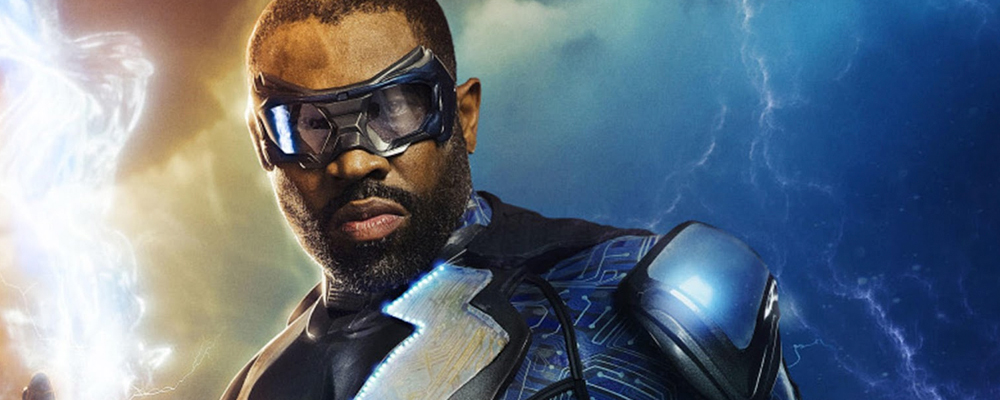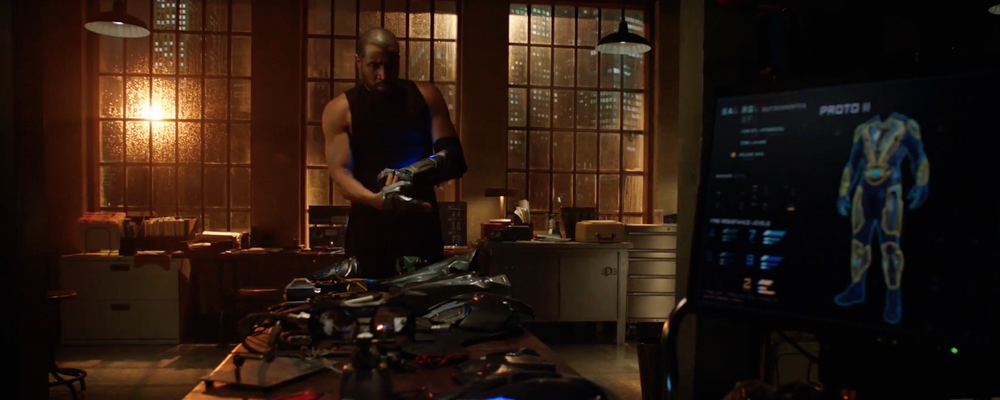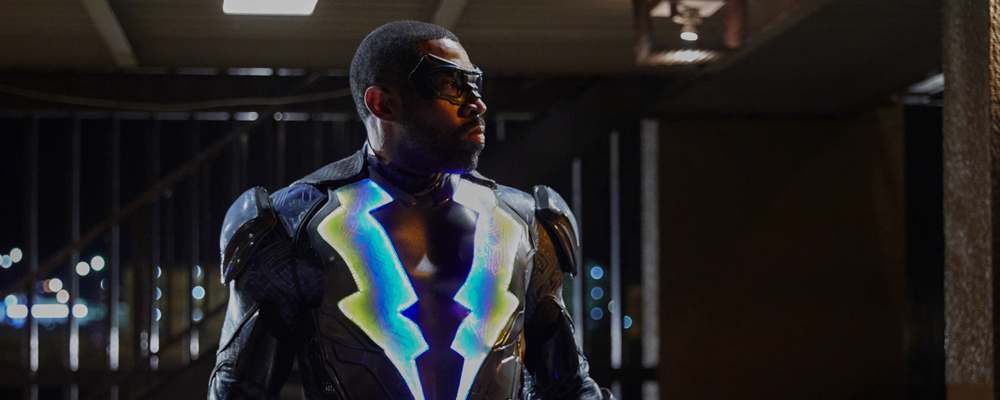‘Black Lightning’ Surges With Power and Relevancy
Aaron Berke
Black Lightning is the latest DC hero to receive the television treatment on the CW, and his arrival couldn’t be timelier. Co-existing with The CW’s other DC television franchises, “Green Arrow,” “The Flash,” “Legends of Tomorrow,” and “Supergirl,” “Black Lightning” adds a new hero to the network’s ever-growing roster, but stands apart from the rest. Black Lightning was DC’s first black super hero, and poetically, he’s the first leading black super hero in DC’s television slate. Moreover, the series has already set a high bar by employing effective references to America’s current racially charged climate. In the pilot episode, “The Resurrection,” this commentary fuels the storyline and helps “Black Lightning” stand out as more thoughtful and consequential than its CW peers.
“The Resurrection” follows protagonist Jefferson Pierce (Cress Williams), the principal of Garfield High School, located in the city of Freeland. The city has become inflicted with crime perpetuated by a gang known as the 100, while the local police have turned to racial profiling in order to combat the violence. Pierce, who 9 years ago battled crime as the electricity-powered metahuman Black Lightning, has since retired in order to focus on his family and affect change as best he can as a high school principal. But Pierce becomes embroiled in Freeland’s gang violence once more when his activist older daughter, Anissa (Nafessa Williams), and rebellious younger daughter, Jennifer, (China Anne McClain) become targets of the 100. Pierce promises his ex-wife Lynn (Christine Adams) that he’ll never become a super hero again. Despite his promises, the 100’s actions force Pierce to act. With the lives of his daughters hanging in the balance, Pierce takes up the mantle of Black Lightning once more.
“Black Lightning” does a fantastic job balancing traditional comic book origin ethos with striking socio-political commentary. The pilot opens with Pierce bailing Anissa out of jail for marching in a protest against the 100’s gang violence. On the highway home, Pierce strictly instructs his daughter not to combat violence with violence, echoing Martin Luther King Jr. but directly quoting activist Fannie Lou Hamer. Pierce is rudely interrupted as a white cop pulls him over and cuffs him. The cop drags Pierce over to a bystander, who apparently witnessed a black man rob a liquor store. The bystander tells the cop that Pierce is not the culprit. Pierce, stopped in his Mercedes, standing there in a three-piece suit, demands to know if the cop believes the robber truly looked anything like him. The old cop simply laughs and walks away. Enraged, Pierce’s eyes glow white. With a glorious burst of power, Pierce fries the cop cars, killing their engines and leaving the cops stranded, dead in the night.
In this moment, Pierce suddenly understands the actions of his daughter. He disposes of the MLK rhetoric and plunges straight into the eye-for-an-eye philosophy of Malcolm X. It’s a terrific way to kick-off the series, immediately infusing “Black Lightning” with political, racial questions while using super heroic powers to create electrifying, vindicating answers. There are scenes like this throughout the pilot. During a riot at club 100, Pierce intervenes to rescue Jennifer from gang members. After he emerges from the club, two cops taser him and try to arrest him simply because he’s the first black male they saw. But Pierce is done playing along. He grabs the taser wires and blasts the cops with electricity, sending them flying backwards. There’s an undeniable thrill factor in seeing an empowered (literally) black man take his revenge on racist white cops. Such moments replicate the crowd-pleasing thrills of Quentin Tarantino’s “Django Unchained,” with Jamie Foxx’s avenging bounty hunter replaced by Cress Williams’ vindicating super hero. As the audience, our impulse for justice makes it impossible not to cheer for Pierce.
Williams makes for a compelling lead, and his hero’s journey in “The Resurrection” is effective, if familiar. We’ve certainly seen the reluctant super hero coming out of retirement to save his family. But Williams has enough presence and believable inner conflict to make you forget the comic book clichés that frequently come into play. We all know he’s going to don the costume by the fourth act. That doesn’t prevent the thrill of finally seeing him in all his costumed glory, or watching him go head to head with the 100’s thugs. Pierce easily disposes of them with his impressive display of lightning. Black Lightning’s powers are teased throughout the episode, but he unleashes them in full during the finale. The special effects are thrilling and the choreography is breathtaking, each electricity-fueled punch packing a visceral wallop. By this point, the socio-political commentary has given way to sheer comic book spectacle. By and large it works, though I wonder if the fusion of the two could have been more effective on a platform other than The CW, a network saturated with teen drama series.
“Black Lightning” mostly surpasses the clichés of CW’s more routine series, though it falters in the sequences between Pierce, his ex-wife and daughters. A series like “Black Lightning” obviously needs family drama in order to feel emotionally rounded, but the dialogue between the Pierces is often rote and cliché. Anissa and Jennifer’s bickering falls directly into the angsty teen drama category. Anissa lectures Jennifer about staying out too late, intimating she should “do the right thing,” while Jennifer comes back at Anissa with rebellious statements such as “I’m not like you and dad!” The dynamic between Pierce and Lynn doesn’t fare much better, segueing out of teen angst and into adult super hero melodrama. Their interactions are based in Lynn’s typical “I left you because you’re a super hero” rationale, with Pierce’s defense of “I did what I had to do to protect this family.” Such super hero stereotypes are par for the course in The CW’s brand, but given “Black Lightning’s” fascinating commentary and apparently high aims, it could have benefited from the stylization of Netflix’s more disciplined Marvel shows rather than its melodramatic CW brethren.
“Black Lightning” works best when it’s blending socio-political commentary with super hero action. Jefferson Pierce’s super heroic actions act as a rallying cry against the racist elements of American society, particularly police corruption. The action sequences are dazzling. Watching Black Lightning in action will pump you full of uncontainable glee. However, the family drama isn’t up to par with the rest of the pilot, and reminds us that we are undoubtedly watching a CW show. Still, “Black Lightning” has plenty of room to grow. It can succeed by making the Pierce family relationships more interesting while building gloriously on the pilot’s successfull, rallying elements. As a pilot, “The Resurrection” is almost complete unto itself, so it’s anyone’s guess where the series goes from here. Hopefully, “Black Lightning’s” melodramatic elements will fizzle out, while its super-charged political commentary continues to surge.
“Black Lightning” premieres Jan. 17 and airs Tuesdays at 9 p.m. ET on The CW.



